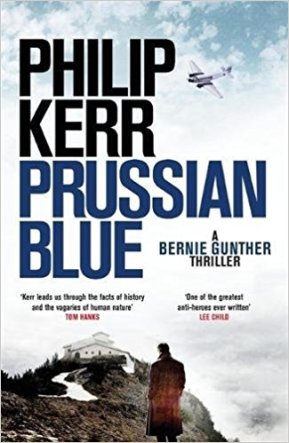
Philip Kerr’s long suffering and world weary policeman Bernie Gunther returns in this superb novel which straddles WW2. With astonishing skill, Kerr keeps two stories on the go, the earlier being set in Bavaria in April 1939, with the blue touch-paper for war already lit and Europe simply waiting for the bang: the second story takes us to October 1956, with a large part of Germany suffering under another tyranny – that of the Russian puppet government of the so-called German Democratic Republic. The two stories appear to be spinning happily along in their own unconnected orbits, but Kerr brings them ever closer together until they meet in a dazzling finale.
 Bernie Gunther fans will already be aware of the company he is forced to keep in the years before and during Hitler’s war. Previous books have found him working uneasily alongside such monsters as Joseph Goebbels, Heinrich Himmler and Gruppenführer Arthur Nebe, but it is his relationship with SS Obergruppenführer Reinhard Heydrich that Kerr (left) has explored in the greatest depth. Now, Heydrich, ever mindful of his place in Hitler’s hierarchy, sends Gunther to Hitler’s Bavarian retreat in Berchtesgaden, ostensibly to investigate the murder of a minor functionary, but hopeful that Gunther’s investigations will embarrass Martin Bormann, personal secretary to the Führer, and Heydrich’s political rival.
Bernie Gunther fans will already be aware of the company he is forced to keep in the years before and during Hitler’s war. Previous books have found him working uneasily alongside such monsters as Joseph Goebbels, Heinrich Himmler and Gruppenführer Arthur Nebe, but it is his relationship with SS Obergruppenführer Reinhard Heydrich that Kerr (left) has explored in the greatest depth. Now, Heydrich, ever mindful of his place in Hitler’s hierarchy, sends Gunther to Hitler’s Bavarian retreat in Berchtesgaden, ostensibly to investigate the murder of a minor functionary, but hopeful that Gunther’s investigations will embarrass Martin Bormann, personal secretary to the Führer, and Heydrich’s political rival.
The parallel 1956 story finds Gunther struggling to keep his false identity as a hotel concierge in the French Riviera. In The Other Side of Silence, the previous book in the series, Gunther became tangled in a net of espionage and treachery involving the writer Somerset Maugham, a former Nazi war criminal, and the British Secret Service. A British woman he befriended – and bedded – now proves to have been a ‘person of interest’ to the GDR, and in particular Erich Mielke, the boss of the East German Ministry for State Security, better known as the Stasi. Mielke travels to the Cote d’Azur, and makes Gunther an offer he can’t refuse. He must either go to England and kill Anne French, preferably with the GDR’s poison of choice, Thallium. The alternative? To be disposed of by the gang of Stasi thugs Mielke has brought with him from East Berlin.
 The human link between these two episodes in Gunther’s life is a fellow policeman called Friedrich Korsch. In his former life, Korsch helped Gunther discover who actually put the bullet from a Mannlicher hunting rifle through the head of a corrupt bureaucrat called Karl Flex on that brisk April day seventeen years earlier. Korsch is nothing if not a survivor. Unlike Gunther, who is forced to sail the post-war seas like a latter day Flying Dutchman, Korsch has taken the King’s Shilling – or at least Erich Mielke’s Deutschmark – and is under strict orders to make sure his former boss gets to England to kill the fugitive Anne French.
The human link between these two episodes in Gunther’s life is a fellow policeman called Friedrich Korsch. In his former life, Korsch helped Gunther discover who actually put the bullet from a Mannlicher hunting rifle through the head of a corrupt bureaucrat called Karl Flex on that brisk April day seventeen years earlier. Korsch is nothing if not a survivor. Unlike Gunther, who is forced to sail the post-war seas like a latter day Flying Dutchman, Korsch has taken the King’s Shilling – or at least Erich Mielke’s Deutschmark – and is under strict orders to make sure his former boss gets to England to kill the fugitive Anne French.
Gunther escapes his Stasi minders and goes on the run in rural France. By hook or by crook, his aim is to get himself into West Germany where he stands a better chance of being protected from the East German thugs who want him dead. As he travels north and east, the two stories begin, slowly but inexorably, to converge. They used to say that all roads lead to Rome. In this novel, all roads lead to abandoned mines dug deep into a hillside in the Saar region – the Schlossberghöhlen. Here, Gunther tracks down the Berchtesgaden killer, and is violently reunited with the former policeman who helped track him down.
Kerr’s genius lies in the fact that he allows Gunther to drink Schnapps and share a cigarette with some of the most notorious killers of the twentieth century. He allows Gunther to make silent moral judgments on those with whom he is forced to rub shoulders, but when it comes to making big decisions, Gunther always takes the path which allows his head to remain connected to the rest of his body. The dialogue, as always, bristles with wisecracks. Kerr lets his hero come to within a cigarette paper’s thickness of signing his own death warrant, but grants Gunther the wit and wisdom to talk – or fight – his way out of potentially fatal confrontations.
Follow this link to read a review of an earlier Bernie Gunther story, A Man Without Breath. Prussian Blue is published by Quercus, and is out now.








